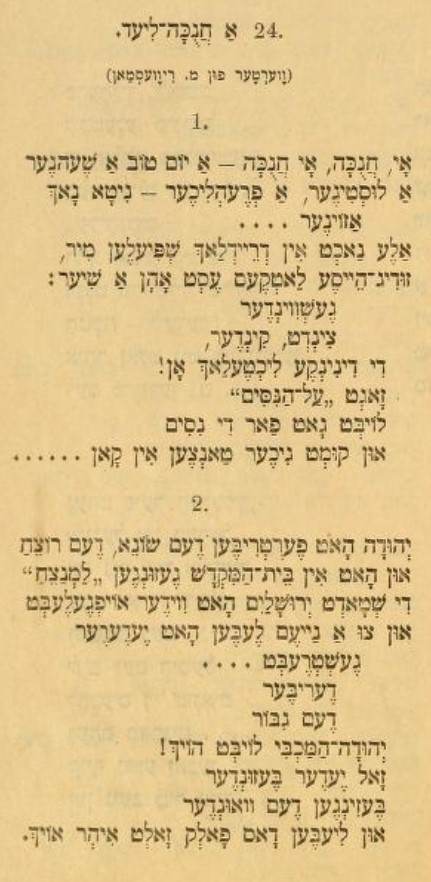Oh Chanukah on:
[Wikipedia]
[Google]
[Amazon]
Oh Chanukah (also Chanukah, Oh Chanukah) is an English version of the Yiddish Oy Chanukah ( yi, Ч—Ч Ч•ЧӣЦјЧ” ЧҗЧұ Ч—Ч Ч•ЧӣЦјЧ” Khanike Oy Khanike). The English words, while not a translation, are roughly based on the Yiddish. "Oy Chanukah" is a traditional Yiddish Chanukah song. "Oh Chanukah" is a very popular modern English Chanukah song. This upbeat playful children's song has lines about dancing the

YouTube Video
- Young boy singing "Oy Chanukah" (the Yiddish version) {{Hanukkah Footer Hanukkah music Jewish songs Yiddish-language songs
Horah
Hora, also known as horo and oro, is a type of circle dance originating in Jewish communities and the Balkans but also found in other countries.
Etymology
The name, spelled differently in various countries, is derived from the Greek ('' khorГ ...
, playing with dreidels, eating latkes
A latke ( yi, ЧңЧҗЦ·ЧҳЧ§Чў ''latke''; sometimes romanized ''latka'', lit. "pancake") is a type of potato pancake or fritter in Ashkenazi Jewish cuisine that is traditionally prepared to celebrate Hanukkah. Latkes can be made with ingredients ot ...
, lighting the candles, and singing happy songs. The song was written by Mordkhe (Mark) Rivesman, and first published in Susman Kiselgof
Susman (Zinoviy Aronovich) Kiselgof (, ; 1878 – 1939) was a Russian-Jewish folksong collector and pedagogue associated with the Society for Jewish Folk Music in St. Petersburg. Like his contemporary Joel Engel, he conducted fieldwork in the ...
's 1912 ''Lider-Zamlbukh'' 'Song anthology''
Naming
According to archives at theUniversity of Pennsylvania
The University of Pennsylvania (also known as Penn or UPenn) is a private research university in Philadelphia. It is the fourth-oldest institution of higher education in the United States and is ranked among the highest-regarded universitie ...
Library, "Freedman Jewish Music Archive", alternate names the Yiddish version of song has been recorded under include "Khanike Days, "Khanike Khag Yafe", "Khanike Li Yesh", "Latke Song (Khanike Oy Khanike)", "Yemi Khanike", and "Chanike Oy Chanike." Chanukah is and was sometimes written as Khanike as that was the standard transliteration
Transliteration is a type of conversion of a text from one script to another that involves swapping letters (thus ''trans-'' + '' liter-'') in predictable ways, such as Greek вҶ’ , Cyrillic вҶ’ , Greek вҶ’ the digraph , Armenian вҶ’ or L ...
from Yiddish according to the YIVO
YIVO (Yiddish: , ) is an organization that preserves, studies, and teaches the cultural history of Jewish life throughout Eastern Europe, Germany, and Russia as well as orthography, lexicography, and other studies related to Yiddish. (The word '' ...
system.
Versions

Alternate Yiddish versions and pronunciations
A very common Yiddish version of the song is below with alternate words, lines, verses, or pronunciations on the right. This version follows the original published version rather than the more popular variant given above. The bolded words are what is changed. The "(x2)" in the bottom left indicated that part is repeated.Hebrew version
There is also a Hebrew version (ЧҷЧһЧҷ Ч”Ч—Ч Ч•ЧӣЧ”), which has the same melody, its words penned byAvraham Avronin
Abraham, ; ar, , , name=, group= (originally Abram) is the common Hebrew patriarch of the Abrahamic religions, including Judaism, Christianity, and Islam. In Judaism, he is the founding father of the special relationship between the Jews ...
. The words correspond roughly to the original (more so than the English version), with slight variations for rhyme and rhythmвҖҷs sake, to match the Sephardic pronunciation which serves as the basis for Modern Standard Hebrew. Thus the first line names the holiday; the second calls for joy and happiness (using two synonyms); in the third the speakers say they'll spin dreidels all night; in the fourth they will eat latkes (note that ''sufganiyot'' (ЧЎЧ•ЧӨЧ’Ч ЧҷЧ•ЧӘ) could also mean latkes in early Modern-Hebrew); in the fifth the speaker calls everyone to light the Chanukah candles; the sixth mentions the prayer Al Hanissim, "On the miracles". The only big change is in the last line - whereas the original calls to praise God for the miracles he performed, the Hebrew one praises the miracles and wonders performed by the Maccabees. This reflects the anti-religious polemic of early Zionism, evident in many other Israeli Chanukah songs. Dati Leumi
Religious Zionism ( he, ЧҰЦҙЧҷЦјЧ•Ц№Ч Ч•ЦјЧӘ Ч“ЦёЦјЧӘЦҙЧҷЧӘ, translit. ''Tziyonut Datit'') is an ideology that combines Zionism and Orthodox Judaism. Its adherents are also referred to as ''Dati Leumi'' ( "National Religious"), and in Israel, the ...
Jews sing an altered version of the line which includes a call to praise God.
In Israel
Israel (; he, ЧҷЦҙЧ©Ц°ЧӮЧЁЦёЧҗЦөЧң, ; ar, ШҘЩҗШіЩ’ШұЩҺШ§ШҰЩҗЩҠЩ„, ), officially the State of Israel ( he, ЧһЦ°Ч“ЦҙЧҷЧ Ц·ЧӘ ЧҷЦҙЧ©Ц°ЧӮЧЁЦёЧҗЦөЧң, label=none, translit=MedД«nat YД«srДҒКҫД“l; ), is a country in Western Asia. It is situated ...
, itвҖҷs still a very popular song, but since the country has a rich inventory of Chanukah songs it is not as exclusively popular as the English version in English speaking countries, or the Yiddish version in the past.
See also
*Hanukkah
or English translation: 'Establishing' or 'Dedication' (of the Temple in Jerusalem)
, nickname =
, observedby = Jews
, begins = 25 Kislev
, ends = 2 Tevet or 3 Tevet
, celebrations = Lighting candles each night. ...
* Hanukkah music
Hanukkah music (or Chanukah music) ( he, Ч©ЧҷЧЁЧҷ Ч—Ч Ч•ЧӣЧ”) contains several songs associated with the festival of Hanukkah.
Hanukkah blessings
There are three Hanukkah blessings (Modern Hebrew: Ч‘Ц°ЦјЧЁЦёЧӣЧ•Ц№ЧӘ ЧңЦөЧ—ЦІЧ Ц»ЧӣЦёЦјЧ” ''Ber ...
* Passover music
Passover songs are songs from the seder, the festive meal associated with the Jewish festival of Passover.
Songs before the meal
Songs before the meal include:
* The Seder (Kadesh Urchatz): a table of contents of the seder ceremony, naming the 15 ...
* Christmas music
* Ma'oz Tsur
References
External links
YouTube Video
- Young boy singing "Oy Chanukah" (the Yiddish version) {{Hanukkah Footer Hanukkah music Jewish songs Yiddish-language songs